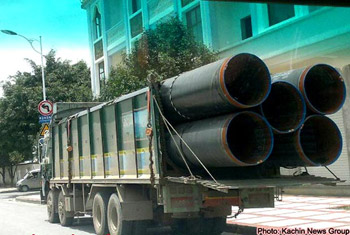Sporadic fighting between the Burmese government and armed ethnic groups has not affected the construction of the China-Burma oil and gas pipelines, according to a top Chinese official.
 Meng Sutie, the director of the Yunnan public security bureau, told the state-run China Daily newspaper that since last year repeated clashes have been reported between Burmese troops and the Kachin Independence Organization in northern Kachin State, where the oil and gas pipelines pass through.
Meng Sutie, the director of the Yunnan public security bureau, told the state-run China Daily newspaper that since last year repeated clashes have been reported between Burmese troops and the Kachin Independence Organization in northern Kachin State, where the oil and gas pipelines pass through.
“Many Chinese companies have invested a great deal in Myanmar, especially in the oil pipeline which passes through the Kachin State area,” Meng told reporters after a panel discussion at the ongoing National People's Congress meetings in Beijing.
“At present, the construction of the oil and gas pipelines is proceeding smoothly and there are no outstanding problems,” he said. “The Myanmar side has been cooperating well and effectively with us on the construction.”
The article said the pipelines, due to be completed in 2013, are expected to be the fourth channel for oil and natural gas to enter China, after ocean shipping, the Sino-Kazakh pipelines and the Sino-Russian crude oil pipeline.
Currently, peace talks between the Kachin ethnic armed group are underway in Ruili, a border town in Yunnan province. About 2,000 to 3,000 Kachins from the China-Myanmar border region are now staying in Yunnan province, Meng told China Daily.
“These people, including some elderly and children, come to visit family and friends through a normal channel, and they stay with their relatives or friends,” he said, denying earlier reports that the Kachins lived in tent settlements. But he said some of Kachins have overstayed in Yunnan Province.
“The government's attitude is, if fighting endangers these people's lives and property safety, Yunnan will offer help and settlement. But, we will encourage them to be peaceful, and we will give necessary humanitarian aid,” China Daily quoted him as saying.
Mizzima reported last week that the Shwe Gas Movement, a nonprofit citizens’ advocacy group, has called for Burma’s government to postpone the pipeline project until community rights and the environment are protected, affected residents share in the benefits, and transparency and accountability mechanisms are in place.
A total of 130 organizations in more than 20 countries held demonstrations to postpone the Chinese-backed project.
The Shwe Gas Project and trans-Burma oil and gas pipelines are currently under construction, originating off Burma’s western coast and terminating in China’s Yunnan Province. They are set to come online in 2013.
The project will become the country’s largest source of foreign revenue generating US$ 29 billion over 30 years, say reports.
The open letter to Thein Sein strongly condemned the confiscation of the thousands of acres of farmlands for the project, and the military offensives against ethnic armies in the pipeline corridor in Northern Shan State. The letter referenced the previous suspension of the Myitsone Dam and Dawei coal-fired power plant and “call[s] for a consistent policy of social and environmental accountability, and an immediate postponement of the project.”
Revenues from oil and gas are not managed transparently in Burma, the letter said. “Under the current unaccountable structure, gas monies from the project will only feed corruption and not benefit the people,” said Wong Aung of the Shwe Gas Movement.
The Shwe Gas Movement advocates for community members’ rights and an equitable benefit sharing system under a framework of sustainable development.


